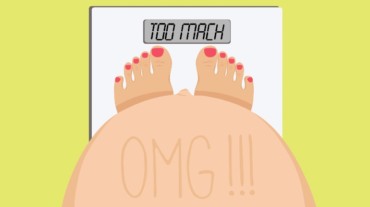
While the whole journey of pregnancy can be quite overwhelming, the soon-to-come pregnancy weight can make things go a little haywire.
However, it is possible to keep unnecessary weight gain at bay during pregnancy. By ‘unnecessary’ weight I mean, the unhealthy gains beyond the following recommendations of the U.S. Institute of Medicine (IOM):
Because, too much pregnancy weight gain can have some serious health implications.
According to Dr. Mala Srivastava, obstetrician-gynaecologist at Sir Gangaram hospital, Delhi, excessive weight gain can lead to health problems like hypertension and diabetes in the mother and the baby. “This in turn can wreak havoc on their health and may even cause delivery complications and increase the risk of mental retardation in the baby,” she explains.
In fact, as per the information released by The National Center for Biotechnology Information, if the mother develops diabetes during pregnancy, it can result in the unborn baby putting on a lot of weight. Having a big, heavy baby can delay birth or make it difficult for the woman to give birth naturally.
Additionally, it can also increase the risk of pre-eclampsia, a life-threatening condition characterised by high blood pressure, excessive swelling and nausea. Not to mention, the excessive weight can put a lot of strain on your bones and make them weak.
Also read: 5 unexpected ways your body might change permanently after pregnancy

Don’t worry, we’ve got you covered. Follow these 6 guidelines and you’ll be just fine:
1. Start right
If you’re not expecting already and are just on the planning stage, getting your weight under control before conceiving is the best thing you could do for yourself and your baby.
The first step is to check your BMI. Figure out your ideal weight and achieve it with the help of a balanced diet and physical activity.
In case you’ve missed the planning-stage train, you could still make up for the lost time and well—health—by eating nutritious and clean as soon as you see two lines on the test kit.
Select Topics of your interest and let us customize your feed.
PERSONALISE NOW2. Eating for two doesn’t mean eating twice
On an average, a non-pregnant, healthy woman needs around 2000 calories every day. During pregnancy, you think, you’ve got to eat for two, but hello! The other “person you think you’re eating for is barely a few inches.
Time for a reality check here: Your fetus will only utilise around 300 calories from your daily intake—that too your second trimester onwards.
So, I understand if you go from 2000 calories a day to 2300 calories. But how would you justify consuming a 500-calorie dessert after every meal?
No one is asking you to “diet”. In fact, Delhi-based nutritionist Kiran Sawney is strictly against the idea of “dieting” whether or not you’re pregnant, but she can’t stop emphasising on the value of healthy eating. “Take a balanced diet and eat wholesome, protein-rich foods,” she says.
Supporting this, Srivastava is quick to suggest eggs, fruits, green-leafy vegetables (cooked), chicken, and pulses as foods to eat during pregnancy and otherwise too.

3. Pregnancy is no excuse to give in to every craving
Read the word ‘every’ in this subhead once more before you accuse me of being insensitive. There is no denying the fact that you deserve to treat yourselves. Afterall, struggling with nausea, countless hormonal changes, mood swings, and what not is no cakewalk.
However, treating yourself at every mood swing and giving in to every craving is eventually going to do you and your waistline a lot of harm in the long run.
Once in a while, indulge in that tub of ice-cream or that cheesy pizza without an iota of guilt. But also balance it out with healthy food and some control over the subsequent cravings.
Just a personal suggestion here: You could use my theory of ‘alternate submission to cravings’. Basically, eat what you crave for once and then control the next craving or two, if possible. This might just help you cut down a few extra cals, what say?
Many nutritionists also advocate eating small meals at regular intervals and increasing fibre and protein intake to beat cravings.
You can also try to find low-calorie alternatives to what you’re craving for. For example, how about having a bowl of Greek yogurt instead of that ice-cream tub?

4. Drink it up, girl!
I could have conveniently mentioned staying hydrated during pregnancy in the ‘fighting-your-cravings’ point. Because water and other fluids can make you feel satiated and help control the temptation of indulging in junk. But the importance of hydration is so much more, it really deserved the attention.
A good water intake can keep constipation at bay, can even prevent uncomfortable bloating, and can make up for the water loss due to excessive peeing during pregnancy.
According to a journal published in The National Center for Biotechnology Information, you need 1–1.5 ml of water for each calorie consumed. So, if you’re upping your calorie intake by 300 each day as discussed above, you also need to add around 300ml of water to your existing daily water intake.
In totality, 10 glasses or 8 ounces of water and other fluids are perfect, the journal says.
5. Snooze away, momma!
Pregnancy is tough. And all those urges to pee at regular intervals and difficulties in changing positions can disrupt your sleep. Now, do I need to remind you how inadequate sleep can slow down your metabolism and make you gain weight?
So, sleep whenever you feel like and get the opportunity to. Didn’t you simply love this point?

6. Don’t miss out on workout, girl!
The bun in your oven wouldn’t wish for its oven to stay lazy and stop moving. In fact, you need to indulge in moderate physical activity to stay sane, keep that blood circulation going, and most importantly—to burn some calories.
The intensity of your physical activity should be discussed with your doctor, but keep moving it, unless advised otherwise.
So, brace yourself for a healthy pregnancy followed by an even healthier delivery.
Also read: Hear it from an ob-gyn: The dos and don’ts of exercising during pregnancy